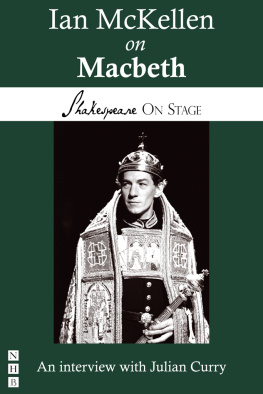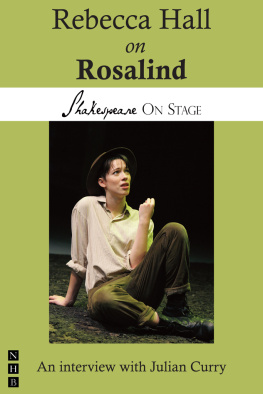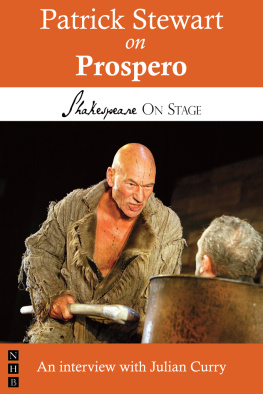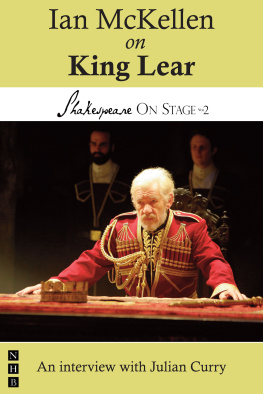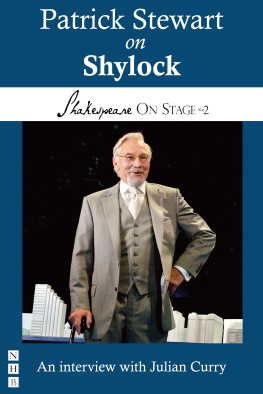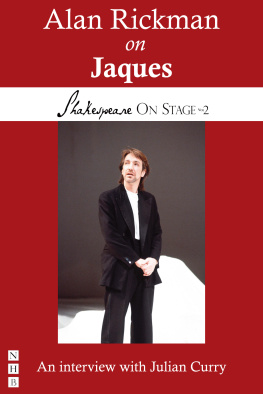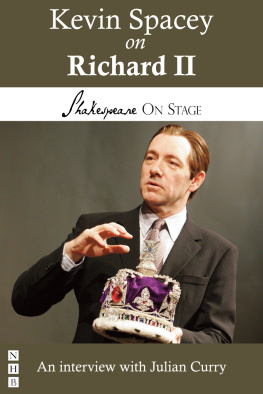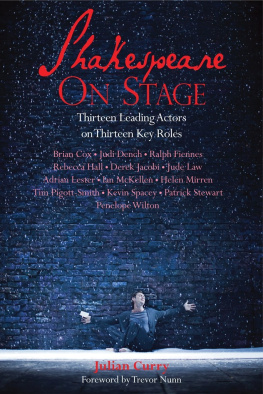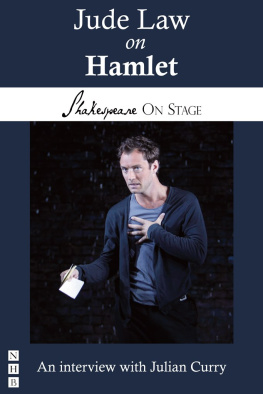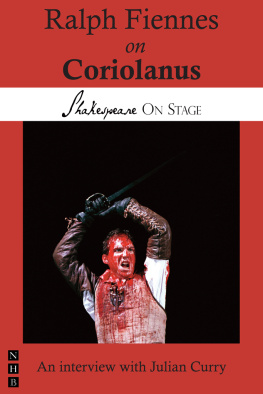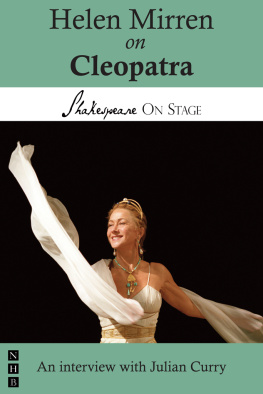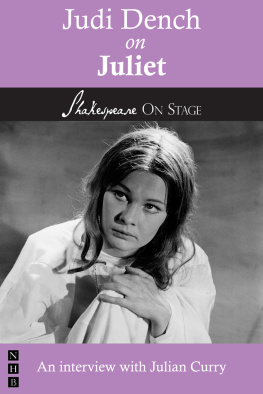Ian McKellen
on
Macbeth
Taken from
SHAKESPEARE ON STAGE
Thirteen Leading Actors on Thirteen Key Roles
by Julian Curry

NICK HERN BOOKS
London
www.nickhernbooks.co.uk
Ian McKellen
on
Macbeth
Macbeth (1606)
Royal Shakespeare Company
Opened at The Other Place,
Stratford-upon-Avon,
on 9 September 1976
Directed by Trevor Nunn
Designed by John Napier
With Judi Dench as Lady Macbeth, Ian McDiarmid as Ross, Bob Peck as Macduff, Roger Rees as Malcolm, and John Woodvine as Banquo
Macbeth, Shakespeares shortest tragedy, is about killing a king and what happens afterwards. The play has powerful supernatural elements, which have contributed to the tradition of its carrying a curse. Theatre lore is rich in examples. Laurence Oliviers 1937 performance was blighted by ill-fitting sets, the director was badly injured in a car crash and had to be replaced, Olivier himself narrowly avoided death by falling stage-weight, and, to cap it all, the theatres founder Lilian Baylis died during the dress rehearsals. Many theatre people refuse to quote from Macbeth or even name it backstage, preferring to call it The Scottish Play.
The role of Macbeth has always been a Mount Everest for leading actors. It contains some of the most thrilling verse in the Shakespearean canon. The character has a stunning poetic imagination but also a challenging blend of soldierly ruggedness with hypersensitivity, and vaulting ambition with fear. It is a murky play, with key scenes often being staged in gloom. The audience cannot easily find any point of identification. Many actors attempt the ascent but few, in critical terms, reach the summit. Ian McKellen was one who did. The production, directed by Trevor Nunn and co-starring Judi Dench, is considered iconic. It opened in Stratford-upon-Avon in 1976 in the RSCs smallest theatre, The Other Place, and subsequently played on the RSC main stage, the Gulbenkian studio theatre in Newcastle, the Donmar Warehouse and the Young Vic in London, before being filmed by Thames Television.
I saw the production over thirty years ago at the Donmar, and remember its impact vividly. It ran for two hours, fifteen minutes without an interval, and was an unforgettable example of chamber Shakespeare, of less being more. The confined space, the small bare stage, the muted colours and minimal props provided a perfect setting for performances that were as true and intense as they were unhistrionic. An attic full of theatrical clutter had been thrown out, and the play swept clean and fresh. It was a revelation.
Ive been in Macbeth three times myself, including playing the lead at a Shakespeare festival in California. I couldnt resist having a go at it, but I should have been more wary. Not only did I fail to reach the summit, I fell to the bottom of a deep ravine, swept away in an avalanche of miscasting, poor direction and my own lousy acting. So I speak from experience. Ive been friends with Ian McKellen since we were at university together, and have worked with him on several occasions. As well as being a brilliant actor, he has rare theatrical intelligence. Ians the best I know at talking about theatre and the craft of acting. Consequently I was as pleased as Punch when he agreed to discuss Macbeth. We met in 2006 at his riverside home in Southwark.
Julian Curry: There have been countless unmemorable Macbeths, but yours was a triumph. Youve also had huge successes with Iago and Richard III. Why do you suppose you have such an affinity with these Shakespearean villains?
Ian McKellen: Well, I suspect its because those are the parts that Shakespeare wrote best, or made most entertaining or of most interest to the audience. Its unexpected, isnt it, that the greatest playwright who ever lived should have written about monsters as successfully as he wrote about heroes and heroines. Macbeth is an extremely popular play. In fact it was the first Shakespeare play I saw, in an amateur production at the Wigan Little Theatre when I was preteens. Its short, which I think helps the audience. The story doesnt have a subplot, so its relatively easy to realise whats going on. Particularly as Macbeth keeps telling the audience whats going on, at least inside his head. And if the actor can convincingly convey, with the immediacy of Shakespeares language, what hes thinking and worrying about and suffering, agonising over, then the audience cant help being engaged. The result of his decisions is appalling, and one has the privilege of being inside the head of someone whose behaviour, if read about in the newspaper, would be dismissed as that of an Evil Monster. But I think Shakespeares message is that those sort of words arent helpful in explaining human behaviour, because they dont explain it, they just give it a label. Therefore I didnt think of Macbeth as a terrible man, any more than I did Iago. I thought of each of them as a man with a problem, and in both cases that problem is shared with the audience.
It was enormously helpful that our production was first put on in The Other Place, which only seated a hundred people. Id seen King Lear done there very successfully, in a Buzz Goodbody production. Its riveting to be so close to the actors when theyre not having to project their performance, either vocally or emotionally. Or indeed to select from it what they want the audience to receive. Its part of our job to let them know whats going on, but if youre working in a big theatre you cant let them know everything, and theyre not close enough to glimpse it for themselves. So theyre relying on the actor carrying the character on his back, as it were. But in The Other Place, the actor and the character can become much closer together. The level of speaking can be conversational and the audience can see not only the eyes, but perhaps whats behind the eyes. A play like Macbeth is about the psychology of the person. You have to be very close to the subject to be of any help. So that was all set up in my favour: (a) its a popular play, its one that people want to see; and (b) we had the right circumstances for plugging into what is special about the play, whats needed if its going to come across. And whilst were on the subject of the play being popular, I believe the reason why its thought of as an unlucky play is that when your stock touring company was in trouble and you heard theyre going to take off a less popular play and substitute Macbeth, it would probably mean that there wasnt enough in the coffers to pay the salaries by the end of the week. So dont even mention Macbeth!
Another reason given for the superstition is the play often being minimally lit, and you get actors falling off the stage in the dark and breaking a leg.
That may well contribute. People also talk about there being supernaturals in the play, but its nothing to do with that. There are many more in Doctor Faustus. Indeed, theres a wonderful story about Doctor Faustus on tour in its original production when the actors suddenly realised that there were eight deadly sins onstage, and the performance was disrupted and ended abruptly. The actors didnt dare go to bed they stayed up all night drinking and playing cards. Isnt it a wonderful notion? I can believe that: that the devil was summoned up in that play. But in Macbeth, well, theres Hecate and the witches, and are the witches
Next page
